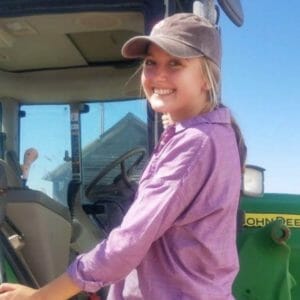
In this series, we’re meeting with Swette Center team members to explore their background in food systems, what they are currently working on, and their vision of food systems transformation.
Read on for an interview with Jane Coghlan, Student Worker.
When did you first get interested in food systems work?
I first became interested in food systems work when I did an internship on an organic farm after my freshman year of college. I was originally just majoring in sustainability, but my grandma happened to know some farmers through her church, the Vetter family, and she told me about their pioneer organic farm in Nebraska called The Grain Place. Even though I had no farming experience at all, I thought that doing an internship with them would be a really great way to learn more about agriculture and how it ties into sustainability. I worked on the farm for a month in the summer and ended up loving it. It was an adventure every day! I learned so much and the farmers were super kind and patient with me when they were explaining everything. I really loved working with all the animals and learning how to drive a tractor. After the internship I was hooked and I wanted to continue learning about agriculture and our food system. I came back to ASU for my sophomore year and changed my major to Sustainable Food Systems and added Nutrition and Healthy Living as a minor. I was really lucky because that year was the very first year ASU had that major. So the stars kind of aligned. Now I am a senior and I still absolutely love my major and the sustainable food system community at ASU.
What are you working on currently?
As a student worker I do a lot of behind-the-scenes work for the Swette Center, but the biggest thing that I’ve been working on is the Meatless Monday research report. I worked with graduate students this past summer for this research project. We interviewed key stakeholders involved with different Meatless Monday initiatives across the country and then put together a best practices document. It was really interesting because we interviewed people who were involved in initiatives in schools, local governments, and nonprofits, and they all had different strategies. We think this report will be very useful for organizations implementing Meatless Monday programs across the US. They’ll be able to see what’s working for other people and maybe change their strategy if need be. This project is ultimately to support the Meatless Monday Campaign goal which is to reduce meat consumption. We’re just wrapping the report up right now and it’ll get published on the Swette Center website pretty soon.
What do you think is a priority in transforming food systems?
I think the first priority is education. In order to transform the food system, we need people to be willing to change their eating behaviors, but no one is going to do that unless they know why they should make a change. Education on our food system needs to encompass how people’s food consumption impacts the environment, the workers, their own health, and so on. I think education is the first big thing, but it isn’t enough solely. Our food system is huge and incredibly complex, so it’s really easy for people to feel disconnected from it. Even if they’re educated on the impacts of their food consumption, it’s so easy to forget about it because they’re not seeing the issues in their day-to-day life. Most people aren’t seeing polluted waterways and deforestation from agriculture in their everyday life, for example, so they often forget that they play a role in it. So, I think that after education, the next priority is finding ways to reconnect people to their food. This can happen in many different ways, but we definitely need to have stronger local food systems. The food you buy from a local farmer is so much more special than food you get at the grocery store that was grown thousands of miles away. I also like the idea of having school gardens, especially at elementary schools. Teaching people from a young age how to grow their own food helps them feel more connected to their food as they become adults. It will make them more interested in things like nutrition, flavor, soil, seeds, etc. I think that having more school gardens would have profound impacts on people as they grow older and become more conscious shoppers.
Any advice for current food systems students?
My advice would be to spend time working on a farm. If you’re already interested in food systems you’re more than likely going to enjoy working on a farm. The knowledge that you gain from farmers is incredibly valuable and will help you throughout your entire career. You can just find a local farm in the area and ask if you can work or volunteer there. Or you could try WWOOFing which is the World Wide Opportunities for Organic Farmers. Through this organization, you can choose an organic farm anywhere in the world to work at temporarily. This is a really great way to travel, experience other cultures, and gain sustainable agriculture skills and knowledge.
What is your favorite food to make?
I really enjoy baking so I have to say that my favorite food to make is vegan chocolate chip cookies. They’re a favorite in my family and with all my friends. My dad in particular is obsessed with them. Whenever I’m at home with my family I make them in bulk so he can freeze some and have them when I’m not there. I’m not an amazing baker or anything; it’s just a really great recipe. It uses coconut milk, coconut oil, and apple sauce which are the 3 main ingredients that make them vegan. Those ingredients make them so rich and moist, and I like to make them pretty thick. Here is a link to the recipe!